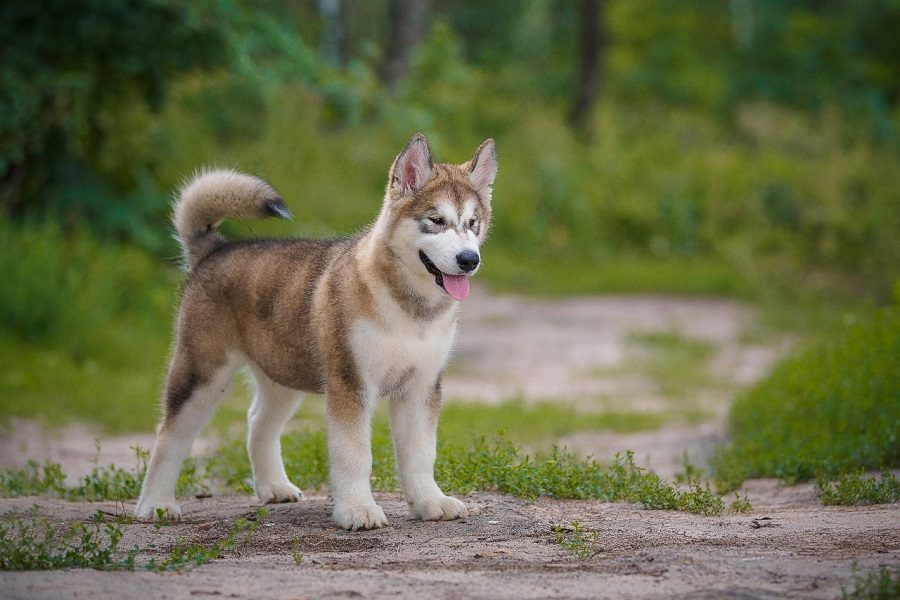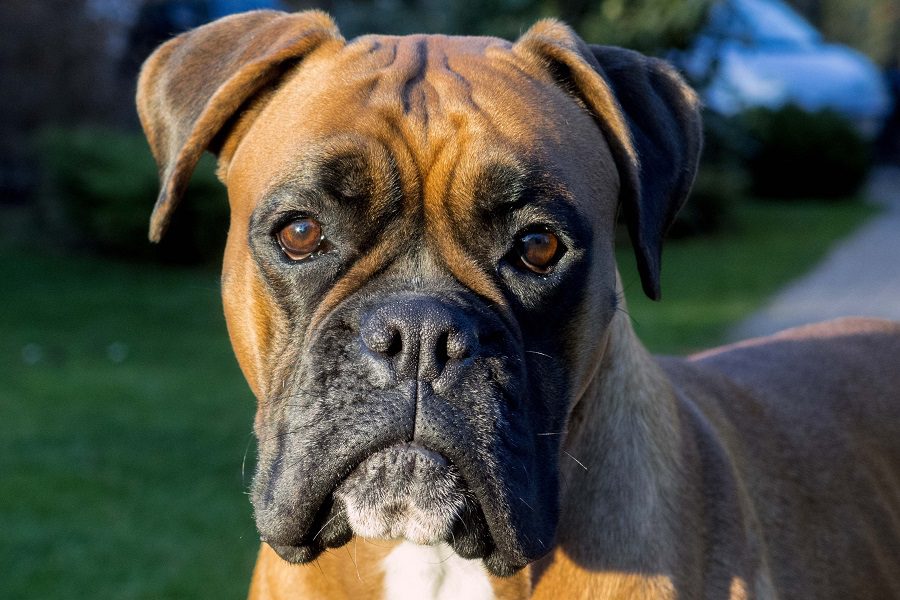Last Updated: 9 months ago
Sure, they’re small, but Yorkshire Terriers have a big personality.
Fans of the toy dog breeds love “Yorkies” for their feisty yet loving companionship. Indeed, the Yorkshire Terrier is the most popular toy dog breed in the United States.
Officially recognized by the American Kennel Club (AKC) in 1885, the Yorkshire Terrier has a curious history as a working dog.
In the 19th century, the dog was bred to work in clothing mills and other factories to catch rats and other rodents. As the name implies, the breed originated in the Yorkshire region of England.
Little is known about the specifics of the breed’s origins. Indeed, in the breed’s early years, almost any dog that was roughly the size and shape of a Terrier with a black body and fawn or silver-colored head and legs was considered a Yorkshire Terrier.
It wasn’t until the late 1860s that the breed was defined. At this point, Yorkies began to make the transition from working dogs to show dogs. The breed was introduced to the United States in 1872.
The popularity of Yorkshire Terriers as family dogs rose and fell over the next several decades. It wasn’t until after World War II that their popularity skyrocketed.
This was thanks in large part to Smoky, a female Yorkshire Terrier that famously served in 12 combat missions, survived 150 air raids, and even parachuted out of a plane in a specially built parachute.
Today, Yorkies are more popular than ever before. They’re ranked as the most popular toy dog breed and the sixth most popular purebred in the United States.
Common Characteristics Of The Yorkshire Terrier
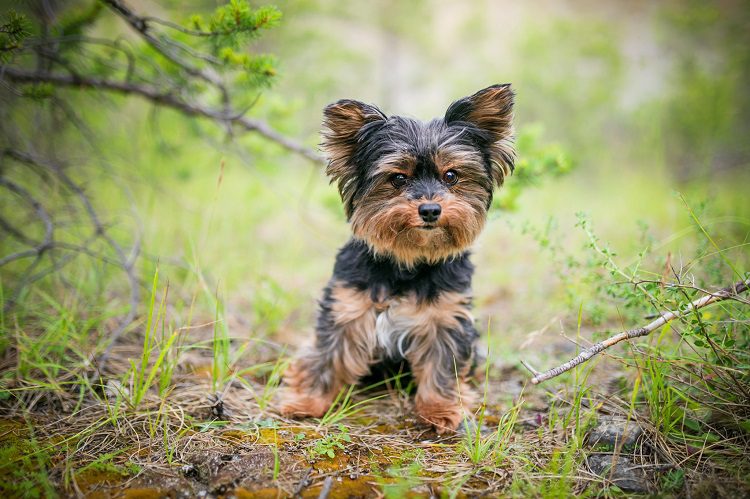
Yorkshire Terriers often live glamorous lives thanks to their small size and long, silky coats. Their beautiful coats allow them to be easily dolled up. Their small size enables them to travel in style, often in special dog purses.
Yet the Yorkie is about more than just looks. These dogs are incredibly intelligent, loving, and playful. In fact, many people consider them big dogs trapped in a small dog’s body.
Like most toy dog breeds, Yorkshire Terriers are bred to be companion dogs. They like to go everywhere their owners go, making themselves comfortable on their laps.
But there is one big difference between Yorkies and other small breeds. While they’re friendly and loving with their family, they’re often suspicious and distrustful of strangers.
For this reason, the American Kennel Club suggests teaching your Yorkie when and when not to bark while they’re still young. Otherwise, their incessant yapping at strange sounds is sure to drive both you and your neighbors mad.
The bravado of the Yorkshire Terrier doesn’t stop there. They are often aggressive toward dogs they’ve never met. And when they see a squirrel, they’ll do their absolute best to chase it down.
Yet Yorkies have a softer side too. They need a lot of love and attention, although it’s best not to overprotect them. If you’re looking for a small dog breed that’s loving and loyal to a fault, the Yorkshire Terrier might just be for you.
Yorkshire Terrier Health Issues
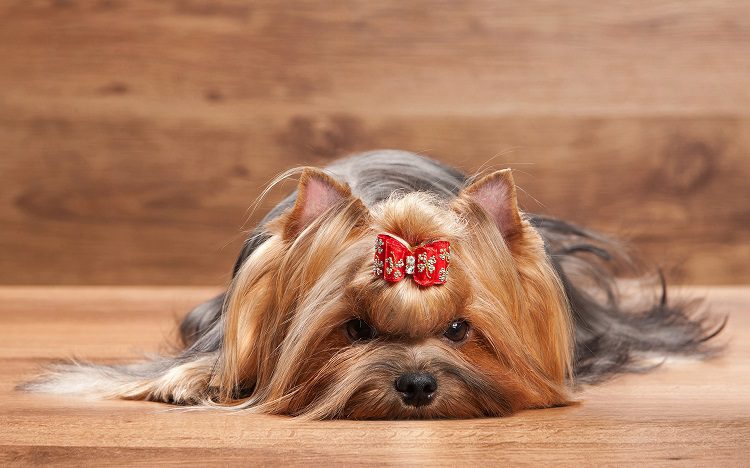
There are a number of health issues specifically associated with Yorkshire Terriers. It’s important to be aware of these problems. It’s also essential to understand that not all Yorkies will develop any or all of these issues.
According to the Yorkshire Terrier Club of America, reverse sneezing is a minor health issue common in Yorkies. It sounds much more serious than it is. It’s simply when your dog makes a choking sound due to overexcitement or eating or drinking too quickly.
Many of the other most common health problems with Yorkies stem from the breed’s small size.
These include patellar luxation, progressive retinal atrophy, portosystemic shunt, hypoglycemia, and collapsed trachea. Eye infections as well as teeth and gum problems can also occur.
In general, however, Yorkshire Terriers are healthy dogs. To further minimize risks, buy your Yorkie puppy from a reputable breeder. Ensure that they have health clearances from the Orthopedic Foundation for Animals (OFA) and the Canine Eye Registry Foundation (CERF).
Yorkshire Terrier Size
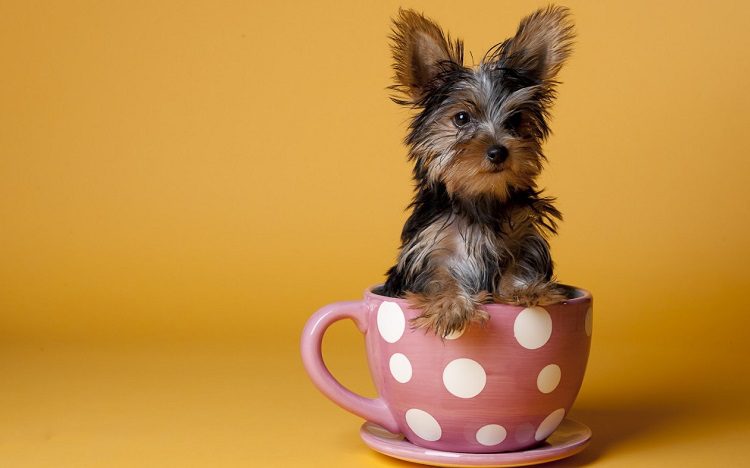
Yorkshire Terriers are a small toy breed of dog. The majority weigh around 6 or 7 pounds, sitting at about 8 or 9 inches tall at the shoulder. However, there is a lot of variation with this breed.
Some healthy Yorkies weigh as little as 4 pounds, while others grow to be a healthy 15 pounds.
Steer clear of breeders that advertise “tea cup” Yorkshire Terriers. The fact that these dogs are smaller than standard puts them at a higher health risk, particularly for genetic disorders.
Personality Traits
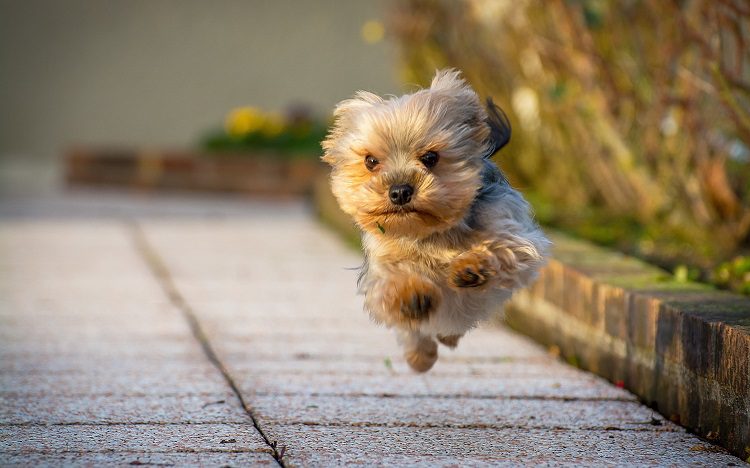
Yorkshire Terriers have well-rounded personalities for such small dogs. One of the most prevalent traits is an adventurous terrier spirit. Beyond that, the personality of each Yorkie is different.
Some Yorkies love to cuddle. They’ll follow inches behind you all day long. They have a hard time being alone at home when you’re gone.
Other Yorkies are more outgoing. They want to interact with as many different people and animals as possible. Yorkies with this personality are often mischievous. It always seems like they’re up to no good.
The key to developing a good personality in your Yorkshire Terrier is setting limits. If you don’t set boundaries with your dog as a puppy, they’ll end up spoiled. They’ll learn bad behaviors and often develop severe separation anxiety.
Like most dog breeds, Yorkies require socialization early on in their lives. Expose them to different people, situations, and environments for the most well-rounded dog possible.
An important factor to note is the protectiveness of the Yorkshire Terrier. Despite their small size, they’ll protect their family like their life depends on it. If they detect an intruder (or what they think is an intruder) in the house, they’ll fight to the death.
Care Instructions
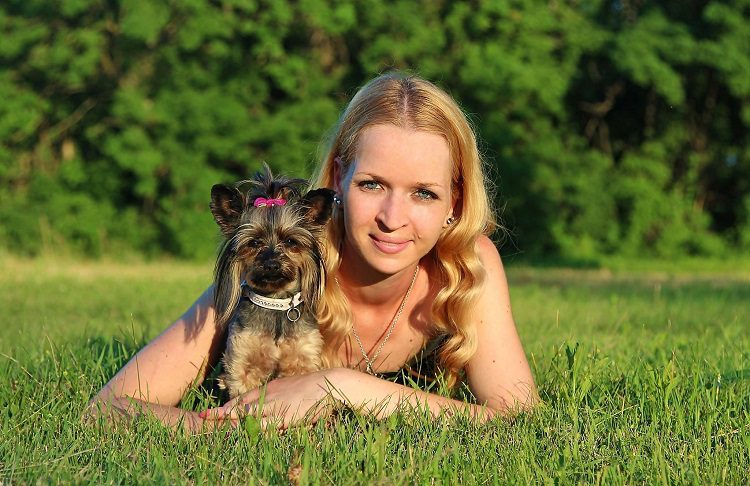
Yorkshire Terriers are generally very easy to care for. They don’t require much other than attention when you’re at home.
Unlike many indoor dogs, Yorkies are very active while inside. They’re constantly playing and running around the house. This means they don’t need a lot of outdoor exercise.
Generally, a short walk each day is all that’s required to keep your Yorkshire Terrier healthy and happy. Of course, they do love to play, so fetch, agility games, and obedience trials are always a fun time for them.
Your Purebred Puppy states that the only tricky area with Yorkshire Terriers relates to housetraining. They are often difficult to housetrain because their “accidents” are very small, making them easy to clean up.
Instead of disciplining the Yorkie like a larger dog, many people let these accidents slide, establishing that it’s okay for the dog to have them.
The specifics of grooming your Yorkie depend on the type of hair it has. Long-haired Yorkshire Terriers require regular, intensive grooming. For short-haired Yorkshire Terriers, a gentle brushing each day prevents matting.
Small breeds of dogs often have dental problems. The Yorkshire Terrier is no exception. Be sure to clean your Yorkie’s teeth on a regular basis. You should also schedule a professional cleaning once per year.
Common Coat Colors
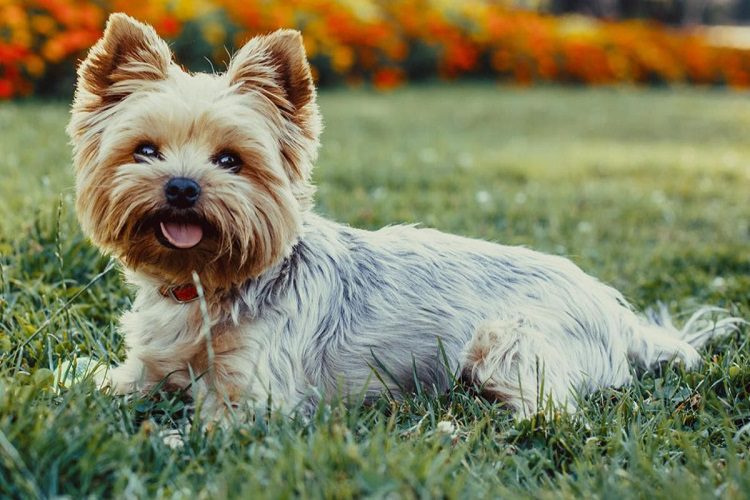
The majority of a Yorkshire Terrier’s coat is a dark-steel blue. It often has a bluish sheen in sunlight. The hair is long and silky.
In addition to their almost-black coat, Yorkies tend to have gold heads. These consist of tan hairs that turn gray relatively early in life. Yorkies also have a tan on their legs that doesn’t extend past their elbows.
Yorkies become lighter in color as they age. These changes are especially prevalent in females. During heat, the coat of the female Yorkshire Terrier goes lighter. It starts to darken again after the season is over.
Temperament
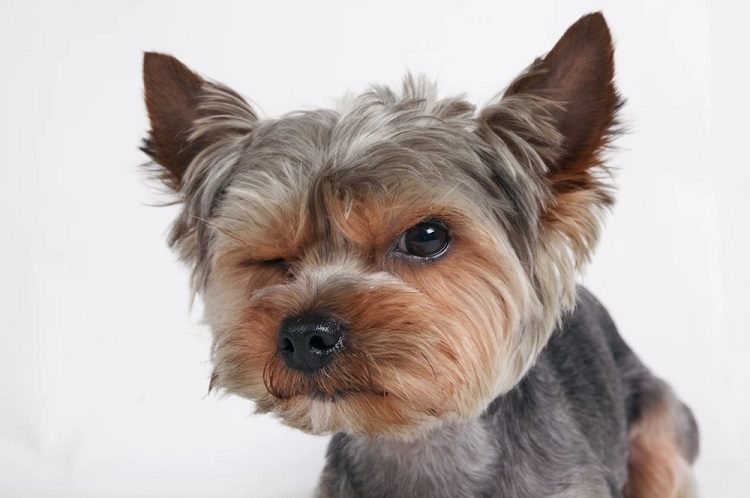
Yorkshire Terriers have wonderful temperaments, especially when raised properly. It’s essential to set rules and boundaries early on.
Other factors that affect your Yorkie’s temperament include heredity, later-life training, and socialization. Those who are interested in buying a puppy should meet the parents and siblings in person.
The temperament of these dogs will reveal a lot about what the puppy will be like when it grows up.
Yorkshire Terriers are very loyal and loving dogs. They want to be a part of your family right from the start. This means its important for their owners to be present. You shouldn’t leave your Yorkie locked away at home alone all day long.
Finally, Yorkies are great with most children and most pets. Like many breeds of small dogs, you should introduce new pets into the household slowly.
Additionally, Yorkies can sometimes be aggressive with smaller children, misinterpreting their attempts at play.
Conclusion
Yorkshire Terriers are great dogs that are a joy to own. Though small in size, they have the personalities of much larger dogs.
The most important thing to keep in mind is the dog’s small size. They often think they are big dogs and will try to pick fights with actual big dogs, leading to injury. Their size also puts them at risk for various dental and gum problems.
Select your Yorkshire Terrier from a reputable breeder, socialize them as early as possible, and be strict about training. Do all of this, and your Yorkshire Terrier will be as good a dog as you could ever dream of.
Resources:

